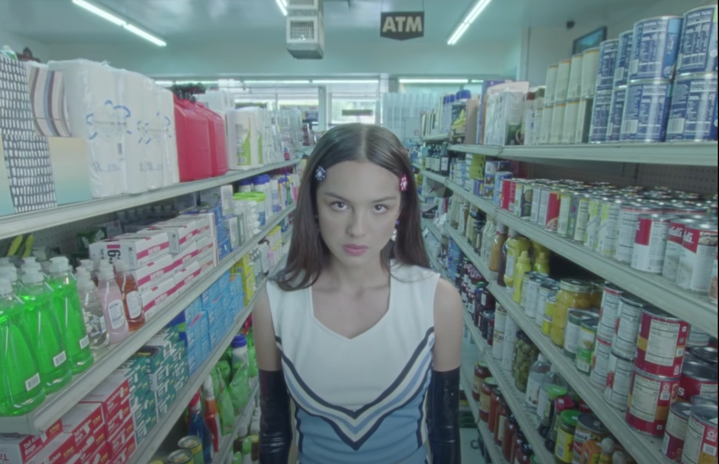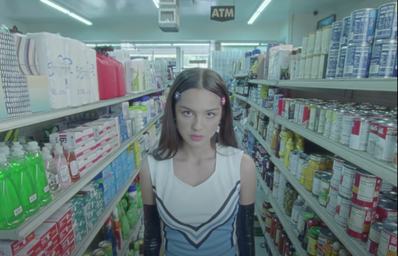On Sept. 9, 2023, Olivia Rodrigo released her much anticipated sophomore album, “Guts,” a sequel to her debut album, “Sour.” Rodrigo describes the album as marking a time of her life when she is “figuring stuff out, about failures and successes and making mistakes.”
Olivia Rodrigo toys with both her fame and her youthfulness in the opening track, “all-american bitch.” Following the critical success of her debut album “Sour,” Rodrigo skyrocketed from her humble beginnings as a Disney kid to a teen pop idol. In this track, she makes the first of many references to the music industry as a machine and herself as a part of that machine: “And I am built like a mother and a total machine / I feel for your every little issue.” This imagery both highlights her immense value in the music industry today, while also diminishing herself to just another artist with a lost identity in the eyes of the critics and society.
In contrast to the machine, Rodrigo wants her listeners to remember that she is just 20-years-old, though the album was written when she was 19. She sings, “I know my age, and I act like it,” calling herself an “all-american bitch” in a Lana Del Rey, teenage angst manner. Starting strong, her opening track tells listeners to take everything she says with a grain of salt: she is only a kid, after all.
The second single for “Guts,” “bad idea, right?” channels Avril Lavigne and Wet Leg as Rodrigo playfully sings about making a bad decision and going to see her ex. Even though she knows it is a bad idea to go see him, like all teenage and college girls who make decisions “for the plot,” she ignores her conscience: “Can’t hear my thoughts (I cannot hear my thoughts) / Like blah-blah-blah.” Even though she is a superstar, just as the first track reminds listeners, Rodrigo is still just a girl who has growing up to do and bad decisions to make while she can still blame them on her age.
Just like the lead single for “Sour,” “driver’s license,” Rodrigo’s lead single for “Guts” was another heartbreak anthem. In “vampire,” she pours out her heart, commenting on a previous relationship with an older partner that made her feel crazy and used. There are some natural parallels to be made between Rodrigo and a young Taylor Swift, who at 19 dated John Mayer, who was 12 years older than Swift. Rodrigo perhaps had a similar experience, for when she sings, “Went for me and not her / ‘Cause girls your age know better,” listeners can’t help but be eerily reminded of Swift’s “Dear John.”
Though the song is about toxic relationships, there may be a double meaning here. Just as her past relationships have exploited her for her fame, one can’t help but wonder if Rodrigo’s insecurities about young fame are a factor in this song, as well. She invokes machinery imagery once more, describing her identity as parts that can be sold off, either for artistry profit or personal exploit: “The way you sold me for parts / As you sunk your teeth into me.”
Like the twin sister to her track “jealousy, jealousy,” in “lacy” Rodrigo compares herself to another woman. She admires her “skin like puff pastry,” “eyes white as daisies,” and the perfume that she wears. However, she also hates herself for feeling this envy: “I despise my rotten mind and how much it worships you.” Rodrigo vocalizes an experience every woman has faced at one point or another: the drowning sense of comparison that sends one into a mindless spiral.
Something similar occurs in Track 11, “pretty isn’t pretty,” where Rodrigo’s insecurities are laid out in the open: “Bought a bunch of makeup, tryna cover up my face / I started to skip lunch, stopped eatin’ cake on birthdays.” She compares herself to other women and the various tips and tricks women constantly complete in order to try and reach society’s standard of beauty. Yet these standards exhaust Rodrigo, who feels helpless, and ultimately discovers that “none of it matters and none of it ends / You just feel like shit over and over again.”
Anxious girls rise for “ballad of a homeschooled girl.” In this track, Rodrigo relays the embarrassing reality of growing up in the perception of others. With the knowledge that anyone and everyone can perceive anyone and everyone, Rodrigo describes the embarrassment of…well…existing: “I stumbled over all my words / I made it weird, I made it worse / Each time I step outside, it’s social suicide.” She describes occurrences that likely no one notices, but for those trapped in the all-consuming belief that everyone is watching, these small instances feel like huge tragedies. This song screams high schooler in the best way possible.
“Making the bed” is an interesting combination of self accountability and sad reflections on fame. On the one hand, Rodrigo acknowledges the toxic decisions she is making: “Push away all the people who know me the best / But it’s me who’s been makin’ the bed.” Contrarily, she wonders about how her decisions connect back to her popularity and asks if the life that she dreamed for is really the life she desires: “I got the things I want, it’s just not what I imagined.” The idea of her career as a machine makes an appearance once more, when she reflects, “They tell me that they love me like I’m some tourist attraction.” She may be the one making some questionable decisions due to her own naivety, but Rodrigo can’t help but believe that her fame must play some part in it all, as she feels watched by everyone and on some days, barely feels like a person at all.
A heartbroken Rodrigo returns with “logical.” In this song, Rodrigo feels angry at herself for falling for someone who treated her poorly and for returning to him over and over again just to meet the same end. She suggests the manipulation she endured from him, singing, “No, I couldn’t get out if I tried / But you convinced me, baby, it was all in my mind.” However, rather than playing the victim card alone, Rodrigo surprisingly takes accountability, “I know I’m half responsible / And that makes me feel horrible.” As with “making the bed,” Rodrigo shows emotional maturity in acknowledging how she contributed to her own anguish, while also owning up to the natural naivety of people her age. Throughout the record, she grapples with a desire to be wise beyond her years, but at the same time wants to unapologetically be her dumb teenage self. Many songs in “Guts” reveal Rodrigo’s break from social convention by owning up to the mistakes that every teenager, whether you are a pop star or not, deals with.
Another song destined to make college girls everywhere call their situationships up, “get him back!” reveals how love and hate can conflict in relationships. The title itself is a fresh combination of the phrases “to get revenge” and to “want him back.” Rodrigo is tempted to call her ex up, but at the same time, she has a strong desire to sabotage him in a myriad of ways including meeting his mother just to “tell her her son sucks.” However, the song also risks portraying Rodrigo as a whiney, spoiled pop star, one who has the luxury of making silly mistakes and having her hookup “fly me to France.” Some girls call their situationships just to end up in a twin XL dorm bed with a navy blue duvet.
If “ballad of a homeschooled girl” is the anthem of social anxiety, “love is embarrassing” is the other side of teenage confusion: what it is like to fall in love while still doing some major growing up. The so-called “love” Rodrigo speaks of is only a falsified love, what appears like true love to her until she is removed from the situation and can clearly see its flaws. Only then does Rodrigo sing, “Jesus, what was I even doing?” as she learns that throwing her energy towards someone who clearly does not care about her will never get her anywhere.
Rodrigo’s emotional strength is best evident in “the grudge,” when she describes a past relationship that she still holds onto. In a parallel to “all-american bitch,” when Rodrigo sings, “I pay attention to things that most people ignore,” in Track 10, Rodrigo sings, “But I hold on to every detail like my life depends on it.” Clearly a deeply sentimental person (she is a Pisces), Rodrigo cannot let go of this experience. Her feelings are ultimately unresolved as she says, “It takes strength to forgive, but I’m not quite sure I’m there yet.” Moreover, the song abruptly cuts off when Rodrigo sings, “It takes strength to forgive, but -,” implying to herself and listeners that she is still healing.
Rodrigo concludes with final notes on her experience in the industry as a young woman in the last track, “teenage dream.” With one last machinery symbol, Rodrigo sings, “But I fear that they already got all the best parts of me / And I’m sorry that I couldn’t always be your teenage dream.” The “parts” she references is her raw talent as a writer and musician. Frequently in the music industry, artists, typically female artists, rise because of their authentic and unbridled talent, but after they reach a certain age, they become invaluable. She sings, “When am I gonna stop being great for my age and just start being good?” Rodrigo wishes to overcome this and not just be a one-hit wonder, but, as so many Disney stars before her, to do so she must break out of the “teenage dream” convention associated with her brand.
As a twenty-something year old who struggled immensely with mental illness in my late teens, her lyricism rings immensely true in this one. In the bridge she sings, “They all say that it gets better, it gets better / but what if I don’t?” At a young age it can be especially difficult to accept that the current moment will pass, but Rodrigo wants to trust the wisdom she has received and wait patiently for the things she wants in life to come into fruition.
The lyric that best describes “Guts” as a whole is surprisingly presented to listeners in the very first song. “All-american bitch” ends with Rodrigo screaming-singing, “I scream inside to deal with it,” and then suddenly and angelically she sings, “All the time / I’m grateful all the time.” In this sequence, Rodrigo displays her screaming teenage self, but in an effort to balance her public image and celebrity status, she must repress her natural teenage emotions and placate herself to be societally pleasing. At the heart of this album, this is Rodrigo’s dilemma: how can she be as famous while still having the space to grow up?
“Guts” by Olivia Rodrigo is a record for teenage girls in their teens and teenage girls in their twenties. While many of the tracks are about the ups and downs of romance, this record is just as much about fame and girlhood as it is about broken love. Lyrically, this album is as compelling, if not more, than “Sour.” The composition and lyrics of this record poignantly narrate a young woman’s naivety and charm, but also surprisingly, a strong sense of herself and the way the world works.


